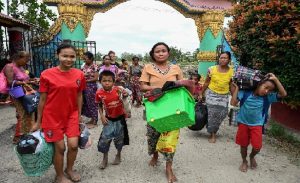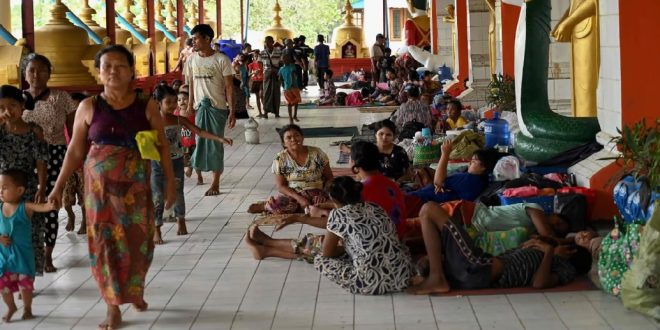14-05-2023
NAYPYIDAW/ DHAKA: Thousands of people in Myanmar and Bangladesh are evacuating residents ahead of Cyclone Mocha, which is expected to bring winds as fast as 175km an hour (108 mph) when it makes landfall.
 The storm is currently in the Bay of Bengal and moving northwards. It is expected to cross the coast between Sittwe in Myanmar’s northwestern Rakhine state and Cox’s Bazar in Bangladesh at around 12.30pm (06:00 GMT) on Sunday, according to the Myanmar Information Management Unit, which is tracking the storm system.
The storm is currently in the Bay of Bengal and moving northwards. It is expected to cross the coast between Sittwe in Myanmar’s northwestern Rakhine state and Cox’s Bazar in Bangladesh at around 12.30pm (06:00 GMT) on Sunday, according to the Myanmar Information Management Unit, which is tracking the storm system.
Authorities have warned of the danger of flooding, landslides and a storm surge of between 2 and 2.7 metres (6.6 feet to 8.9 feet).
“This is the first cyclone to threaten Myanmar this Monsoon season and there are grave concerns about the impact especially on already vulnerable and displaced communities,” the United Nations Office for the Coordination of Humanitarian Affairs (UNOCHA) said in an update on Friday. It noted that more than 230,000 people in Rakhine are living in camps for displaced people “located in low-lying coastal areas susceptible to storm surge”.
About six million people in areas in the path of the storm Rakhine and the three northwestern states of Chin, Magway and Sagaing were already in need of humanitarian assistance, UNOCHA added.
The ASEAN Coordinating Centre for Humanitarian Assistance on disaster management (AHA Centre) warned of the potential for a “catastrophic disaster” and said it was coordinating with Myanmar’s military for its aircraft to pick up stockpiles of essential supplies form warehouses in Thailand and Malaysia.
 Myanmar was plunged into crisis in February 2021 when the military seized power from the elected government of Aung San Suu Kyi.
Myanmar was plunged into crisis in February 2021 when the military seized power from the elected government of Aung San Suu Kyi.
Fighting between the military and civilian armed groups known as the People’s Defence Forces (PDF) has been raging in many of the areas now threatened by the storm and, the areas at risk are not fully controlled by a single authority, which is likely to complicate the response.
Many residents have already been forced out of their homes due to aerial bombardment and arson attacks by the military, while internet and telecommunications blackouts in some townships could prevent people from receiving disaster alerts, the Chin Human RIghts Organization warned.
The army used similar tactics in Rakhine in 2017 when it drove hundreds of thousands of mostly Muslim Rohingya across the border into Bangladesh where they continue to live in sprawling refugee camps. (Int’l News Desk)
 Pressmediaofindia
Pressmediaofindia




